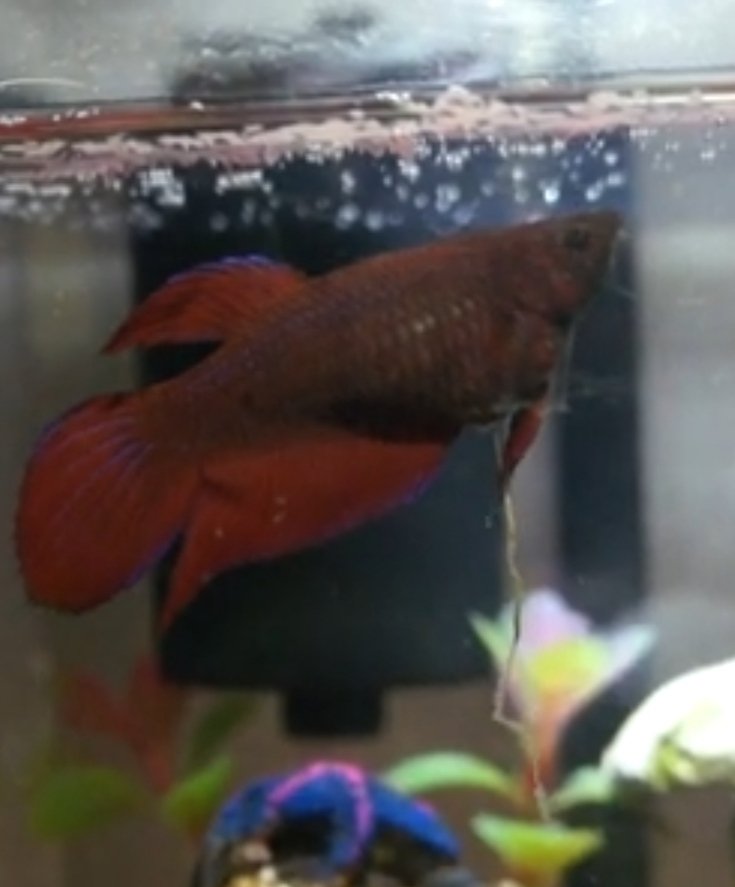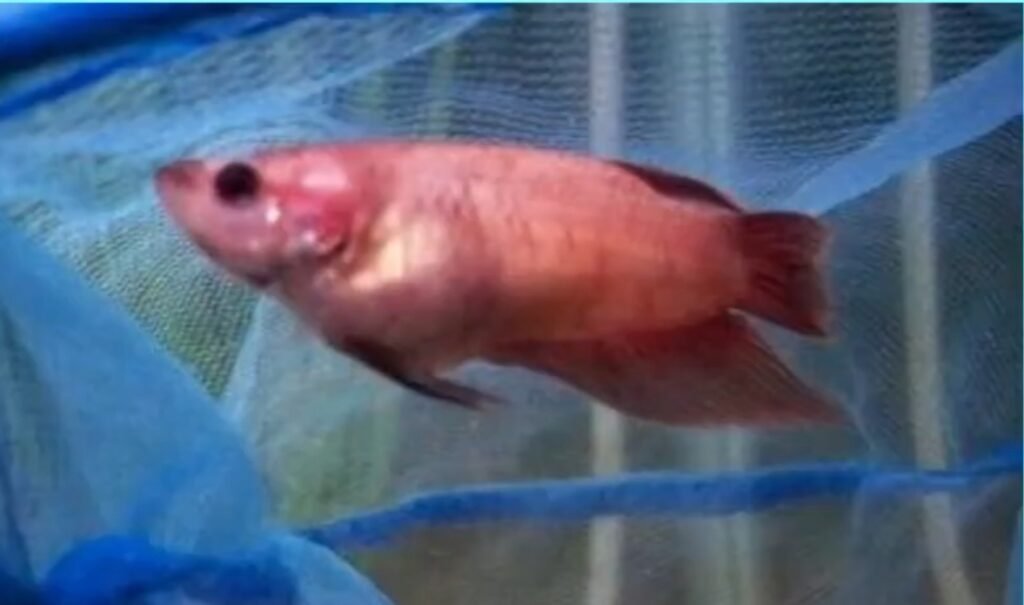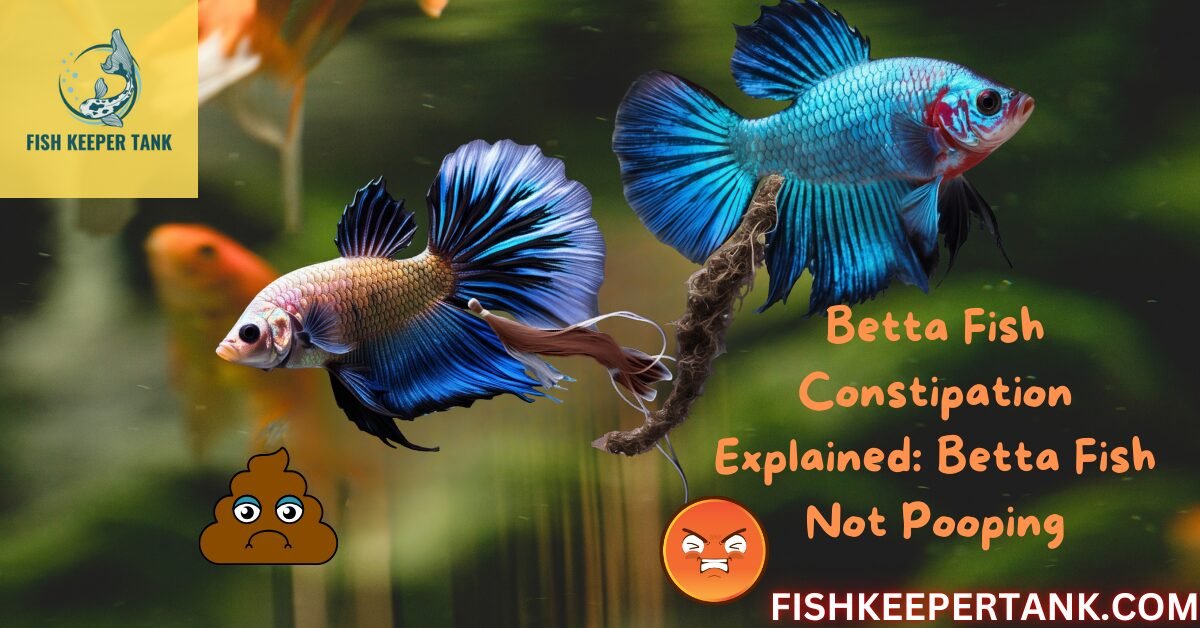Introduction
Betta Fish, also known as Siamese Fighting Fish, are popular among fish enthusiasts for their vibrant colors and flowing fins. If you’re a Betta fish owner, you may have noticed changes in your pet’s behavior or appearance that raise concerns. However, like any pet, they can face health issues, and Constipation in Betta Fish is one of the common problems that can affect their well-being.
Betta Fish not Pooping can lead to a range of health problems if not addressed promptly. Let’s dive into “Betta Fish Constipation Explained: Guide To Betta Fish Not Pooping” and walk you through everything you need to know about Betta fish constipation, from its symptoms to effective treatments.

Understanding Betta Fish Habitat
Betta fish are native to Southeast Asian shallow waters, particularly Thailand, Cambodia, and Vietnam. In the wild, they live in warm, shallow water bodies such as rice paddies, slow-moving streams, and stagnant ponds. The habitat of Betta fish plays a significant role in their overall health, including Betta Fish Constipation.
In captives, mimicking their natural environment is essential to keep your Betta fish healthy. A well-maintained tank with appropriate water conditions, temperature, and space will help prevent any problems like Constipation.
Can Bettas Get Constipated?
Yes, Betta fish can experience constipation like any other living creature with a digestive system. Constipation in Betta fish is a condition where the fish has difficulty passing feces. It is essential to recognize the signs early to ensure your Betta remains healthy.
What Does Healthy Betta Fish Poop Look Like?
Healthy Betta fish poop is usually brown or tan in color and should have a firm, solid consistency. The waste is typically compact and has a slightly curved pellet-like structure. Sometimes, you will notice a reddish tint color, which can be caused by the food your Betta fish has been eating. Regular, healthy bowel movements are a sign that your Betta’s digestive system is functioning correctly.
What Does Abnormal Betta Fish Poop Look Like?
Abnormal Betta fish poop can vary in appearance but commonly includes pale, stringy, or white feces that often trail behind your Betta fish as it swims around. It may also appear unusually large or misshapen or may be accompanied by a lack of regular bowel movements. These signs indicate that your Betta may be experiencing constipation or other digestive issues.
What Is Betta Fish Constipation?
Betta fish constipation occurs when there is a blockage in the fish’s digestive system, and it is unable to expel waste effectively. This can lead to discomfort and more severe health problems. For a Betta, a healthy digestive system is crucial for overall well-being.
Causes of Constipation in Betta Fish
There are various factors that lead to Betta Fish Constipation. Understanding the causes of constipation can help you prevent it.
- Overfeeding: It is one of the most common causes of constipation in betta fish. Betta fish have small stomachs and can easily become constipated if they are overfed. Feeding too frequently can also negatively affect Betta’s digestive system.
- Low-Quality Food: Cheap or poor-quality fish food may lack the necessary nutrients or may contain fillers that are hard for Betta fish to digest.
- Lack of Fiber: Fiber in food is essential for healthy digestion. A diet lacking in fiber can complicate waste expulsion, leading to constipation.
- Not Enough Live Food: In the wild, Betta fish consume a variety of live foods that are rich in nutrients and fiber. A diet lacking in live or frozen foods like daphnia or brine shrimp can contribute to constipation.
- Too Much Blood Worm: Blood worms are rich in vitamins and minerals. However, excessive feeding can lead to constipation. Blood worms are a favorite treat for Betta fish but should be fed in moderation as part of a balanced diet.
- Swim Bladder Disease: Those betta fish suffering from swim bladder disease result in negative effects of buoyancy and the ability to move waste through the digestive system, causing constipation.
- Parasites and Other Infections: Internal parasites can cause blockages in the digestive tract, leading to constipation in Betta fish.
- Other Infections: Bacterial or fungal infections can also affect the digestive system, leading to constipation.
- Lack of Exercise: Inadequate swimming space can affect a Betta’s physical health. Betta fish need space to swim and exercise. A lack of movement can slow down their digestive system, leading to constipation.
- Tank Size: A tank that is too small can restrict your Betta’s movement, contributing to a lack of exercise and constipation. A cramped environment can lead to stress and digestive issues.
- Cold Water: Betta fish are tropical fish that require warm water to maintain their metabolism. Cold water can slow down their digestion, leading to constipation.
Diagnosis, Signs, and Symptoms
Recognizing the signs and symptoms of constipation in Betta fish is crucial for early intervention.
- Swollen Belly or Bloating: A visibly swollen belly is one of the most obvious signs that something is wrong or the betta fish is constipated.
- Lack of Appetite or Anorexia: If you notice that your Betta is not eating, then it may be a sign of constipation.
- Spitting Out Food: Healthy Bettas will consume food readily, whereas constipated Betta fish may attempt to eat but will spit out the food due to discomfort or bloating.
- Lethargy: A constipated Betta may become lethargic and less active than usual. This could signal a problem.
- No Feces: The absence of feces or poop in the fish tank over a few days is a clear sign that your Betta is constipated.
- Pale, Stringy Poop: If your Betta does pass feces, but it is pale, stringy poop, then it is often associated with digestive distress. Such a type of excretion could indicate constipation or other digestive issues.
- Floating or Sinking: If your Betta has trouble maintaining its position in the water, floating to the top or sinking to the bottom, it could be a sign of swim bladder disease caused by constipation.
Treatments for Betta Fish Constipation
There are several effective treatments for Betta fish constipation. The key is to start treatment as soon as you notice symptoms.
- Fasting: One of the first steps in treating constipation is to stop feeding your Betta for 24-48 hours. This gives their digestive system time to clear out any blockages.
- Dietary Changes: Switching to a high-fiber diet can help alleviate constipation. Feeding your Betta foods like daphnia and blanched spinach, which are rich in natural fiber, helps move waste through their digestive system more efficiently.
- Place a Mirror or Another Tank Mate: Stimulating your Betta with a mirror or another compatible tank mate can encourage movement and exercise, which aids digestion.
- Epsom Salt Bath: An Epsom salt bath can help to relieve constipation and bloating. Dissolve a small amount of Epsom salt in a separate container of dechlorinated water and let your Betta soak in it for a few minutes.
- Feed Shelled Pea: Cooked shelled peas are soft, fibrous food that can act as a natural laxative, promoting bowel movements. Make sure to remove the skin and feed only a tiny piece to avoid overfeeding.
- Use Oral Medication: In more severe cases, you may need to use oral medications designed explicitly for fish constipation. Consult a vet or a specialist before administering any medication.
- Use Fish Laxatives: Fish specifically designed laxatives can be effective but should be used as a last resort and under professional guidance.
- Adjust Water Temperature: Increasing the water temperature slightly can help speed up your Betta fish metabolism and relieve constipation. Make sure to monitor the water temperature so that it does not harm your betta fish.
- Replace with a Bigger Tank: If space is an issue, then consider upgrading to a larger fish tank to provide more space for your betta fish to exercise.
- Add Aquarium Plants: They provide hiding spots and encourage movement, improving exercise. Aquarium plants also provide natural fiber when nibbled on by Betta fish.
Other than Constipation, Betta fish may also suffer from New Tank Syndrome. Know more>>>
Prevention Tips
Preventing constipation in your Betta is often easier than treating it. Here are some effective strategies
- Balanced Diet: Ensure your Betta gets a balanced diet with a mix of dry and live foods such as high-quality pellets, live or frozen foods, and occasional vegetables. Ever wonder How Long Can A Betta Fish Go Without Food?
- Avoid Overfeeding: Follow a strict feeding schedule with controlled portions to prevent overfeeding.
- Maintain Water Quality: Clean water is essential for Betta fish health. Regular changes and monitoring of the water quality help keep the Betta fish healthy and stress-free.
- Tank Size: A larger tank gives the betta fish more space for movement and exercise, which helps prevent constipation.
Do Betta Fish Recover From Constipation?
Yes, with appropriate treatment, most Betta fish fully recover from constipation without long-term effects. Early intervention and ongoing care are key to ensuring a swift recovery. Regular monitoring and adjustments to their diet will help to prevent future occurrences.
How Often Should a Healthy Betta Fish Poop?
A healthy Betta fish should poop at least once a day or every few days. Regular bowel movements are a sign of a healthy digestive system. If you notice long gaps without bowel movements, it may indicate a problem.
Where Do Betta’s Poop From?
Betta fish poop from an opening called the vent, which is located near the base of their tail, underneath their body. It is a normal anus, just like other fish species.
Dropsy vs Constipation In Betta Fish
Dropsy and constipation are different conditions but can have similar symptoms. Dropsy is a serious condition caused by internal fluid build-up and is often fatal, while constipation is usually less severe and treatable.
When To Suspect Dropsy
If your Betta exhibits severe swelling along with other signs like scales sticking out, it may be dropsy rather than constipation. Consultation with a vet is advisable.
Can Bettafix Cure Dropsy?
While Bettafix may help with minor infections, it does not cure Dropsy. Dropsy requires more intensive treatment, so it is better to seek appropriate veterinary care.
Can Betta Fish Die From Constipation?
While constipation itself is usually not fatal, however in severe cases, untreated constipation can lead to serious health complications, including death. Untreated constipation can also lead to swimbladder disease, which can be fatal. It is crucial to take immediate action if symptoms arise.
Are Some Betta Breeds More Prone To Constipation?
There is no concrete evidence that suggests some Betta breeds are more prone to constipation than others. However, individual betta fish may have different diets and tolerances to water conditions. The shape and size of betta species also play a crucial role.
It is assumed that short-finned bettas, like Plakats, tend to have fewer constipation issues than their long-finned counterparts, such as Halfmoons and Crown Tails. Long-finned bettas often face difficulties in swimming, which can contribute to digestive issues, including constipation.

Conclusion
Constipation in Betta fish is a common but manageable condition. This article: “Betta Fish Constipation Explained: Guide To Betta Fish Not Pooping,” helped to understand the causes, symptoms, and treatments that you can perform to keep your Betta healthy and prevent constipation from becoming a serious issue. Regular monitoring of your Betta’s diet, environment, and behavior will go a long way in ensuring their well-being. Remember: “A Healthy Betta Is A Happy Betta.”
Frequently Asked Questions
Q: How can I tell if my Betta is constipated?
ANSWER: Look for signs like a swollen belly, lack of appetite, and abnormal poop.
Q: Can I prevent constipation in my Betta fish?
ANSWER: Yes, by maintaining a balanced diet, avoiding overfeeding, and ensuring proper tank conditions.
Q: Is fasting my Betta fish safe?
ANSWER: Yes, fasting for 24-48 hours is a standard and safe method to treat constipation.
Q: Can Betta fish eat peas for constipation?
ANSWER: Yes, a small, shelled, cooked pea can be a natural laxative for Betta fish.
Q: What should I do if my Betta fish is not pooping?
ANSWER: Start fasting your fish, then consider dietary changes or other necessary treatments.
You May Also Checkout:

